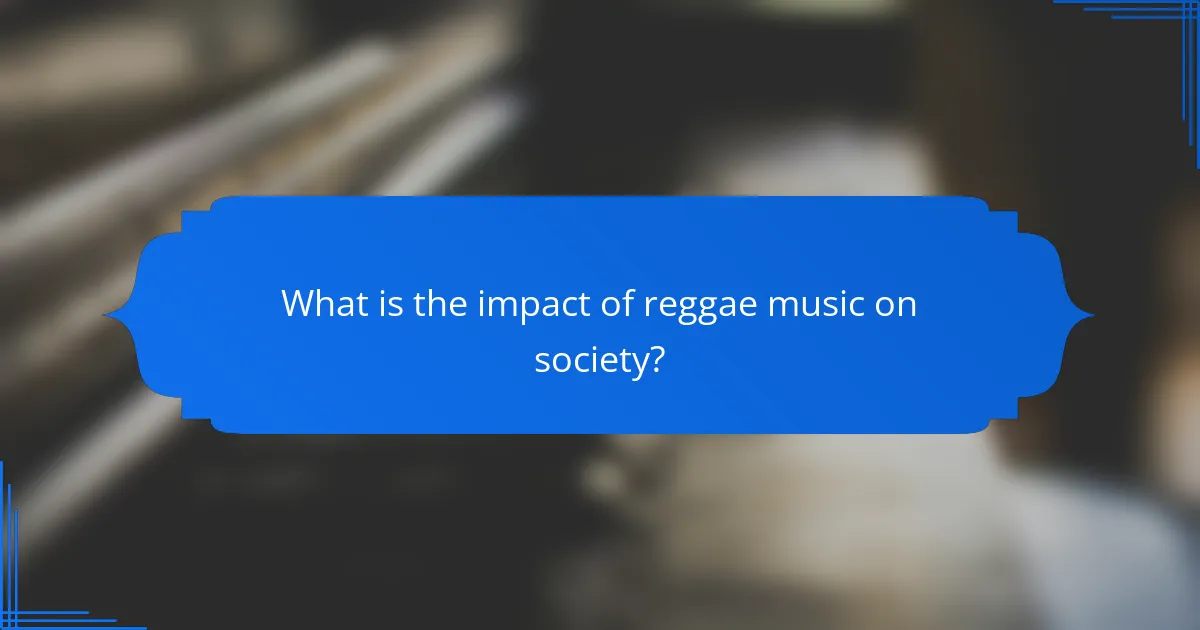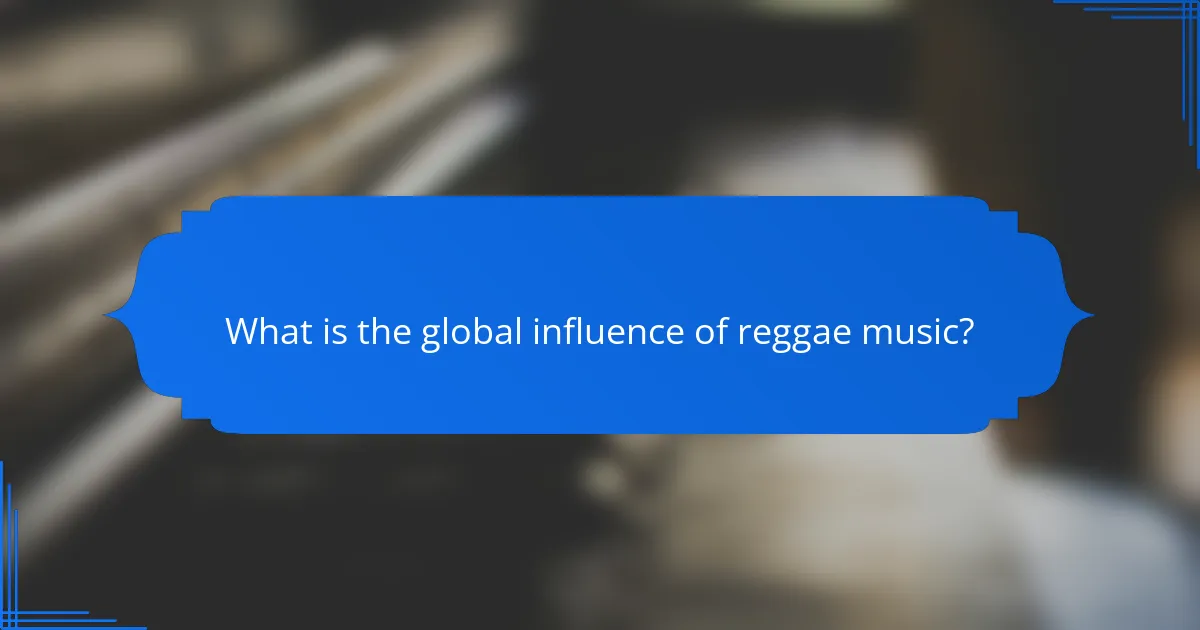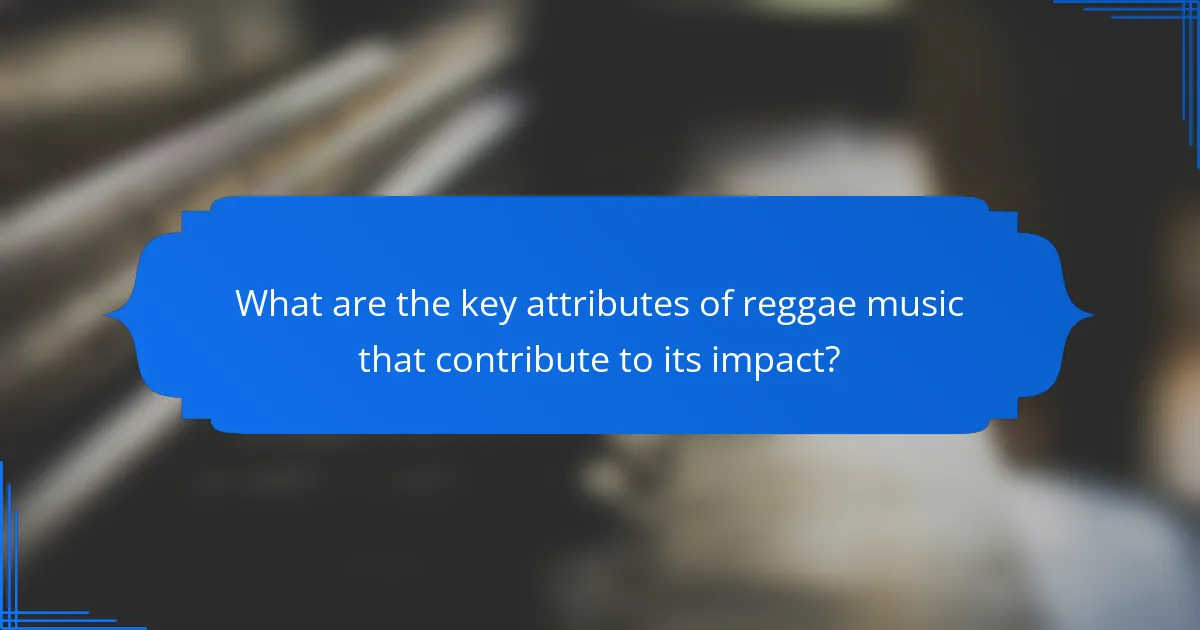Reggae music is a genre that originated in Jamaica in the late 1960s and has since become a significant global influence. It promotes social change and cultural awareness through its themes of equality, justice, and resistance against oppression. Iconic musicians, particularly Bob Marley, have utilized reggae to convey messages of peace and unity, inspiring activism and community solidarity. The genre’s distinctive rhythmic style, lyrical content addressing social issues, and deep cultural roots contribute to its enduring appeal and impact on various musical genres and cultural movements worldwide. Reggae also plays a crucial role in enhancing mental well-being and amplifying the voices of marginalized groups.

What is the impact of reggae music on society?
Reggae music profoundly impacts society by promoting social change and cultural awareness. It addresses themes such as equality, justice, and resistance against oppression. Iconic musicians like Bob Marley have used reggae to spread messages of peace and unity. The genre has influenced global movements, inspiring activism and community solidarity. Reggae’s roots in Jamaican culture foster a sense of identity and pride. Studies show that reggae music can enhance mental well-being and community cohesion. The genre’s rhythms and lyrics often resonate with marginalized groups, amplifying their voices. Overall, reggae serves as a powerful tool for social commentary and cultural expression.
How does reggae convey social messages?
Reggae conveys social messages through its lyrics, rhythms, and cultural context. The genre often addresses themes such as poverty, inequality, and resistance against oppression. Artists like Bob Marley used their music to promote messages of peace, love, and social justice. Songs like “Get Up, Stand Up” call for activism and awareness. Reggae’s roots in Rastafarian culture also emphasize social consciousness and community solidarity. The infectious rhythms make these messages accessible and engaging to a wide audience. This combination of lyrical content and musical style helps spread awareness and inspire change.
What themes are commonly explored in reggae lyrics?
Reggae lyrics commonly explore themes of social justice, love, [censured], and resistance. Social justice is often highlighted through lyrics addressing inequality and oppression. Love is frequently depicted in various forms, from romantic to communal. [censured] is a significant theme, reflecting Rastafarian beliefs and connection to a higher power. Resistance against political and social injustices is a recurring motif in many songs. Historical context shows reggae’s roots in the struggles of the Jamaican people, further emphasizing these themes. Artists like Bob Marley have famously used their music to convey these messages, making reggae a powerful vehicle for social commentary.
How do these themes resonate with listeners?
Reggae themes resonate with listeners by addressing social issues and cultural identity. These themes often include messages of resistance, love, and unity. Many listeners connect deeply with the struggles depicted in the lyrics. For instance, songs like “Get Up, Stand Up” by Bob Marley advocate for social justice. This connection fosters a sense of community among fans. Research shows that music can influence emotions and social attitudes. A study by the University of Cambridge found that music with strong messages can inspire collective action. Thus, reggae’s themes create a powerful bond with its audience.
What role do iconic musicians play in the reggae movement?
Iconic musicians play a crucial role in the reggae movement by shaping its sound and message. Artists like Bob Marley and Peter Tosh popularized reggae worldwide. Their music often addressed social issues, including poverty and injustice. This helped raise awareness about the struggles faced by marginalized communities. Additionally, these musicians contributed to the cultural identity of reggae. They infused their work with elements of Rastafarian beliefs. Their influence extended beyond music, impacting fashion and lifestyle. The global reach of their songs helped spread reggae’s message of unity and resistance. This solidified reggae’s place in the global music landscape.
Who are the most influential reggae artists and what are their contributions?
Bob Marley is the most influential reggae artist. He popularized reggae worldwide. His songs addressed social issues and promoted peace. Albums like “Legend” and “Exodus” have sold millions. Peter Tosh is another key figure. He advocated for human rights and social justice. His hit “Legalize It” focused on marijuana legalization. Jimmy Cliff brought reggae to the mainstream with “The Harder They Come.” His film of the same name highlighted Jamaican culture. Burning Spear is known for his roots reggae style. His music emphasizes African heritage and [censured]. Toots and the Maytals helped define the reggae sound. Their energetic performances and hits like “Pressure Drop” gained international acclaim. Each artist contributed uniquely to reggae’s global impact.
How do these musicians shape the genre’s identity?
Musicians shape reggae’s identity through their unique styles and social messages. Bob Marley, for instance, popularized themes of love, resistance, and unity. His songs, like “One Love,” emphasize peace and community, influencing the genre’s core values. Peter Tosh introduced a more militant stance, addressing issues of injustice and equality. His track “Equal Rights” highlights the fight against oppression, shaping reggae’s political voice. Additionally, musicians like Jimmy Cliff brought reggae to a global audience, further defining its cultural significance. Their contributions create a diverse yet cohesive identity that resonates with listeners worldwide.

What is the global influence of reggae music?
Reggae music has a significant global influence, shaping various musical genres and cultural movements. It originated in Jamaica in the late 1960s and has since spread worldwide. Reggae’s themes of social justice, resistance, and love resonate across diverse cultures. Artists like Bob Marley have become global icons, promoting messages of peace and unity. Reggae festivals attract audiences from all over the world, showcasing its widespread appeal. The genre has influenced hip-hop, rock, and pop music, integrating its rhythms and styles. Additionally, reggae has contributed to the global discourse on issues like racism and inequality. Its impact is evident in the adoption of reggae elements in various international music scenes.
How has reggae music spread across different cultures?
Reggae music has spread across different cultures primarily through migration, media, and cultural exchange. Jamaican immigrants took reggae to various countries, particularly the United States and the United Kingdom, during the 1960s and 1970s. The genre gained significant exposure through radio, television, and music festivals. Artists like Bob Marley played a crucial role in popularizing reggae globally. His music addressed universal themes of love, resistance, and social justice, resonating with diverse audiences. Reggae has influenced various music styles, including hip-hop, rock, and pop, further embedding it in global culture. Collaborations between reggae artists and musicians from other genres have also facilitated its spread. Reggae remains a symbol of cultural identity and social activism, continuing to inspire movements worldwide.
What are some notable international reggae festivals?
Some notable international reggae festivals include Reggae Sumfest in Jamaica, Rototom Sunsplash in Spain, and the Sierra Nevada World Music Festival in the United States. Reggae Sumfest, held annually in Montego Bay, is the largest reggae festival in the world. Rototom Sunsplash features a diverse lineup and attracts thousands of attendees each year. The Sierra Nevada World Music Festival showcases reggae alongside various global music genres. These festivals celebrate reggae culture and its global influence.
How do local adaptations of reggae reflect cultural diversity?
Local adaptations of reggae reflect cultural diversity through unique musical styles, languages, and themes. Each region incorporates its cultural elements into reggae. For example, in Africa, reggae often blends with traditional rhythms and local languages. This creates a distinct sound that resonates with local audiences. In Latin America, reggae may incorporate salsa or cumbia influences. These adaptations highlight the region’s cultural heritage. Furthermore, the lyrics often address local social issues, enhancing cultural relevance. The fusion of reggae with local genres demonstrates its versatility and global appeal. This adaptability allows reggae to connect with diverse communities worldwide.
Why is reggae considered a tool for social change?
Reggae is considered a tool for social change due to its focus on social justice and human rights. The genre emerged in Jamaica in the late 1960s, encapsulating the struggles of marginalized communities. Artists like Bob Marley used their music to address issues such as poverty, inequality, and political oppression. Marley’s song “Get Up, Stand Up” became an anthem for activism and empowerment. Reggae’s messages resonate globally, inspiring movements for equality and justice. The genre’s rhythms and lyrics encourage unity and resistance against oppression. This cultural impact is evident in protests and social movements worldwide, demonstrating reggae’s role as a catalyst for change.
How have reggae songs inspired political movements?
Reggae songs have inspired political movements by conveying messages of resistance and social justice. Artists like Bob Marley used their music to address issues such as poverty, oppression, and human rights. Songs like “Get Up, Stand Up” became anthems for civil rights movements. The genre’s roots in Rastafarian culture also promoted anti-colonial sentiments. Reggae’s global reach influenced political activism in various countries. For instance, in South Africa, reggae music was pivotal during the anti-apartheid struggle. The lyrics often encouraged unity and empowerment among marginalized communities. Overall, reggae has served as a powerful tool for political expression and mobilization.
What are some examples of reggae’s impact on social justice issues?
Reggae music has significantly influenced social justice issues through its messages and activism. Artists like Bob Marley used their platforms to address poverty, inequality, and human rights. Marley’s song “Get Up, Stand Up” became an anthem for resistance against oppression. Peter Tosh’s “Equal Rights” called for justice and equality, highlighting the struggles of marginalized communities. The genre has also raised awareness about issues such as racial discrimination and police brutality. Reggae festivals often promote social justice themes, creating spaces for dialogue and activism. Furthermore, organizations like the Bob Marley Foundation continue to advocate for social change, reflecting reggae’s enduring legacy in social justice movements.

What are the key attributes of reggae music that contribute to its impact?
The key attributes of reggae music that contribute to its impact include its rhythmic style, lyrical content, and cultural roots. Reggae features a distinctive offbeat rhythm known as the “one drop” beat. This rhythm creates a relaxed yet engaging sound that resonates with listeners. The lyrics often address social issues, such as poverty, injustice, and resistance, which fosters a sense of community and activism. Reggae’s cultural roots are deeply tied to Jamaican history and Rastafarian beliefs, adding layers of meaning and identity. Iconic musicians like Bob Marley have amplified these attributes, bringing global attention to reggae. The genre’s ability to blend various musical influences, such as ska and rocksteady, also enhances its appeal. Overall, these attributes work together to create a powerful and enduring musical form.
How does the rhythm and style of reggae influence its message?
The rhythm and style of reggae significantly influence its message by creating a unique auditory experience that enhances lyrical content. Reggae features a distinctive offbeat rhythm, known as the “one drop,” which emphasizes the bass and drums. This rhythmic foundation fosters a laid-back and contemplative atmosphere. The style often incorporates syncopation, which draws attention to the lyrics and their meaning.
Reggae lyrics frequently address social issues, resistance, and empowerment. The groove of the music complements these themes, making them more accessible and relatable. For instance, artists like Bob Marley used reggae’s rhythm to convey messages of unity and peace. The combination of rhythm and lyrical content creates a powerful medium for expressing cultural identity and social commentary.
Research shows that the emotional impact of music is closely tied to its rhythm and style. Studies indicate that rhythmic patterns can evoke specific feelings, enhancing the message being conveyed. Thus, reggae’s rhythm not only supports its lyrical themes but also amplifies its overall impact on listeners.
What are the defining musical characteristics of reggae?
Reggae music is characterized by its distinctive rhythm and beat. The emphasis is placed on the offbeat, often referred to as the “one drop” rhythm. This creates a laid-back, relaxed feel that is central to reggae. Additionally, reggae incorporates a steady bass line that provides depth and groove. The use of guitar and keyboard accents further enhances the rhythmic quality. Reggae often features socially conscious lyrics that address themes like love, peace, and social justice. Notable artists like Bob Marley have popularized these characteristics globally. The genre’s roots can be traced back to Jamaica in the late 1960s, solidifying its cultural significance.
How do these characteristics enhance the emotional impact of the lyrics?
The characteristics of reggae music enhance the emotional impact of the lyrics through rhythm, melody, and socio-political themes. The distinctive offbeat rhythm creates a laid-back atmosphere that allows listeners to feel the message deeply. Melodies in reggae often convey a sense of hope or struggle, resonating with personal experiences. Lyrical content frequently addresses social issues, which connects with audiences on a personal level. For instance, Bob Marley’s “Redemption Song” discusses freedom and resilience, evoking strong emotions. The combination of these elements fosters a powerful emotional response, making the messages memorable and relatable. This emotional depth is a hallmark of reggae, contributing to its global influence.
What can listeners learn from reggae music?
Listeners can learn about social justice and equality from reggae music. The genre often addresses themes of oppression and resistance. Songs like “Get Up, Stand Up” by Bob Marley emphasize the fight against injustice. Reggae also promotes messages of love and unity. It encourages listeners to embrace peace and harmony. Additionally, reggae highlights the importance of cultural identity. The music reflects the struggles and triumphs of the Jamaican people. Overall, reggae serves as a powerful vehicle for social commentary and awareness.
How can reggae inspire personal growth and community building?
Reggae can inspire personal growth and community building through its messages of unity and resilience. The genre often promotes themes of love, social justice, and empowerment. These themes encourage individuals to reflect on their own lives and strive for improvement. For example, songs like “One Love” by Bob Marley advocate for togetherness and peace. This fosters a sense of belonging and encourages collective action within communities.
Moreover, reggae music has historically served as a voice for marginalized groups. It addresses social issues such as inequality and oppression. This creates awareness and motivates listeners to engage in community activism. Events like reggae festivals often bring people together, strengthening social bonds.
Research shows that music can enhance emotional well-being and community cohesion. A study published in the Journal of Music Therapy highlights how group music-making can improve social skills and reduce feelings of isolation. Thus, reggae not only inspires personal growth but also cultivates a strong sense of community.
What are some practical ways to engage with reggae culture?
Attend reggae concerts and festivals to experience live performances. Engage with local reggae communities through social media and events. Learn about reggae music’s history and its social messages. Explore reggae literature and documentaries for deeper understanding. Dance to reggae music in cultural dance classes. Support reggae artists by purchasing their music and merchandise. Collaborate with local reggae groups for community events. Embrace reggae fashion to celebrate the culture’s unique style.
The primary entity of this article is reggae music, which significantly influences society through its promotion of social change and cultural awareness. The article examines how reggae conveys social messages, explores common themes in its lyrics, and highlights the role of iconic musicians in shaping the genre’s identity and global impact. Additionally, it discusses reggae’s influence on social justice issues, its adaptability across cultures, and the emotional resonance of its rhythms and lyrical content. Overall, the article provides a comprehensive overview of reggae’s contributions to activism, community cohesion, and cultural expression.